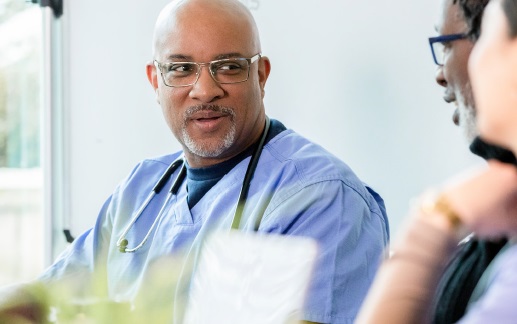Chapter 6 – Leadership and management for SAS doctors
By: Dr Kirstin May
The 2021 SAS contracts set a clear expectation that Specialty Doctors should get involved in non-clinical activities to develop their range of expertise as well as ensure their progress through the pay scale threshold 2. Varied and relevant non-clinical experience and activity is an essential requirement for appointment as a Specialist. Our appraisal and revalidation system sets an expectation of all doctors, regardless of grade, to be active in quality improvement, and encourages teaching, leadership, management, research and innovation. Such parity of expectation must come with parity of esteem and opportunity. Many employers have recognised the change in culture and expectation from and for SAS doctors, and now regularly advertise training opportunities and leadership roles to SAS as well as consultant grades. Where this is not done, it is commonly oversight or ignorance, rather than malicious intent, and could and should be challenged.
Experienced anaesthetists are all leaders in daily theatre activities, and this is an excellent foundation for other leadership roles. Anaesthetic departments need a variety of clinical leaders and the General Provision of Anaesthetic Services (GPAS) guidelines ask departments to actively encourage SAS doctors to engage with leadership opportunities. Senior and experienced SAS doctors should be given the opportunity to take on additional roles within the department. GPAS explicitly expects a lead role to be filled by an autonomously practising anaesthetist, without requiring consultant status. There should not be any leadership roles that require consultant status, if person specification and criteria are otherwise met, and such criteria should not systematically exclude or disadvantage SAS doctors. There are many examples of SAS doctors in leadership roles such as clinical leads and directors, appraisers and appraisal leads, clinical governance leads, principle investigators in research, educational supervisors, training programme directors, Association Board members and Officers, RCoA Council members and Board Chairs, etc.

Leadership theory and learning
Theoretical courses are offered in many regions via SAS tutors and may increase your self-confidence. Whilst they might underpin your lived experience, they cannot be a substitute for leadership in action. Many Trusts run internal leadership programmes to identify and nurture talent, and these should be open to SAS doctors. Some Trusts have programmes allowing senior executives or board members to be shadowed by emerging leaders.
The Association runs events with non-clinical content (Find an event – Association of Anaesthetists). The Royal College of Anaesthetists runs a lecture series in leadership and management as well as hosts a network of clinical leaders (Clinical Leaders – The Royal College of Anaesthetists). Together the College and Association run regular networking events.
The British Medical Association (BMA) also offers non-clinical education to its members. If you are an accredited trade union representative, the BMA offers a wide range of leadership and negotiation training to you.
All the UK medical royal colleges in 2011 established the Faculty of Medical Leadership and Management (FMLM) as the professional home for medical leadership, offering education, peer support and networking.
How to get started in leadership
With clinical leadership roles come responsibilities for teaching, governance, liaison with other staff groups, recruitment, complaint handling. etc, so all of these areas can be good starting points to gain experience and show talent for wider roles. Teaching is often seen as the most accessible area for self-development. There is huge demand for teaching from less experienced doctors and other members of the team. Teaching can also usefully develop your public speaking skills and confidence, as well as show your enthusiasm, talent and potential outside the operating theatre.
To start with, small amounts of leadership activity may fit within your supporting professional activities (SPA) time, which is allocated to fulfil your appraisal and revalidation requirements. As workload and responsibility grows, so must the time allocated to such activity in job plans. This is reflected in the 2021 SAS contracts through an increase in expected SPA time. Many non-clinical roles also carry a locally agreed time tariff for job plans, which should be the same regardless of the grade of the post-holder. If you feel you should be allocated time to carry out non-clinical work but are not, or you feel the time allocated does not reflect your role, it is useful to keep track of the time required and work done to inform the next round of annual job planning.
Often ability and talent are not matched by confidence. A personal mentor in your workplace can help. Every doctor should have the opportunity to access mentoring and coaching through their employer and many Trusts have a network to offer this. The Association also has a mentorship scheme for its members (Mentoring – Association of Anaesthetists). NHS England offers mentoring through the NHS Leadership Academy free to the user (Coaching and Mentoring – Leadership Academy).